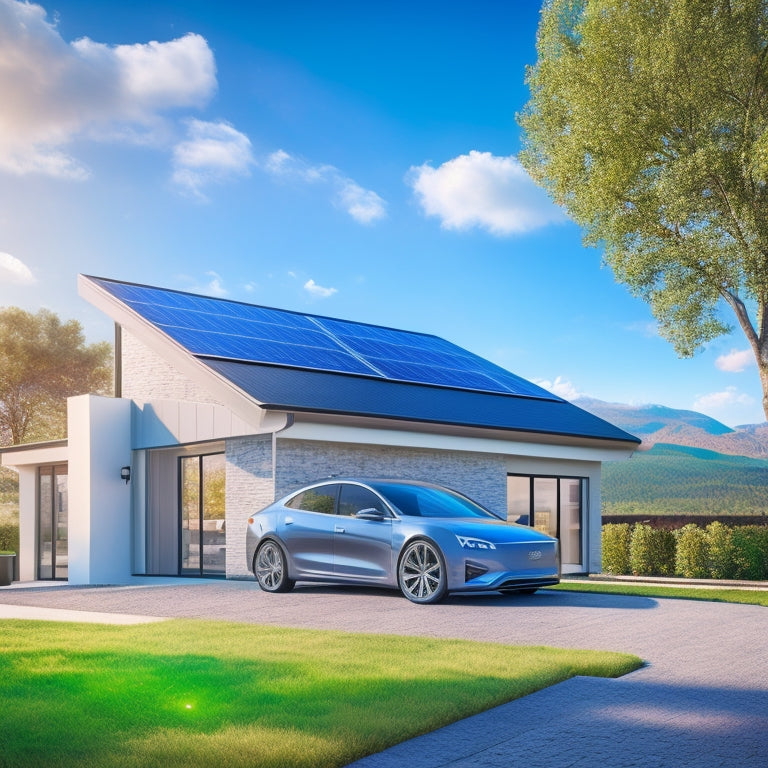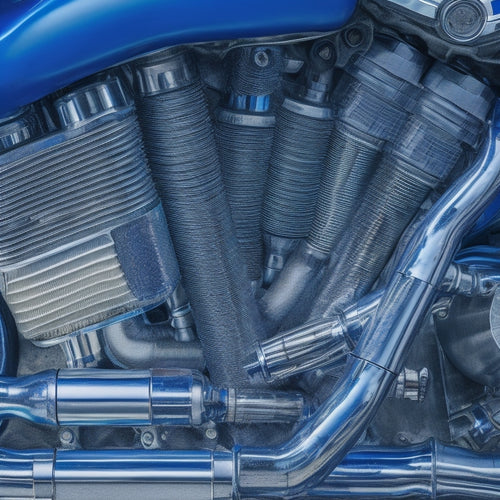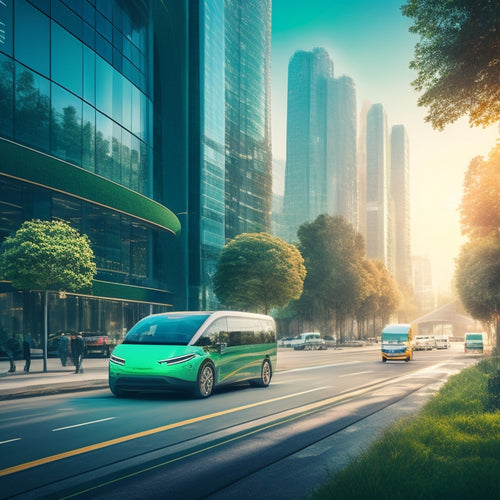
3 Best Solar Panels for Electric Vehicle Owners
Share
You're looking for the best solar panels to charge your electric vehicle while minimizing your carbon footprint and operating costs. Top-rated models from Panasonic, Tesla, and SunPower offer high-efficiency rates and durable designs. Panasonic's HIT-240 model boasts a 21.8% efficiency rate, while Tesla's Solar Roof tiles and SunPower's X-Series Residential Solar Panels offer 20.6% and 22.8% efficiency rates, respectively. To optimize your solar panel system, consider factors like orientation, tilt, and shading mitigation strategies. By pairing the right solar panels with smart energy management, you'll be driving on sunshine in no time - and there's more to explore on how to maximize your solar energy output.
Key Takeaways
• Consider top-rated solar panels from reputable manufacturers like Panasonic, Tesla, and SunPower for high-efficiency rates and durable designs.
• Panasonic's HIT-240 model offers a 21.8% efficiency rate, while Tesla's Solar Roof tiles provide a 20.6% efficiency rate.
• SunPower's X-Series Residential Solar Panels boast a 22.8% efficiency rate, making them a top choice for EV owners.
• Optimize solar panel system orientation, tilt, and shading mitigation strategies to maximize energy output for your EV.
• Take advantage of EV incentives, such as the US federal government's 30% tax credit for solar installations, to reduce costs.
Top-Rated Solar Panels Compared
When shopping for solar panels, it's important to evaluate top-rated models from reputable manufacturers, such as Panasonic, Tesla, and SunPower, which offer high-efficiency rates and durable designs. You want to make sure you're getting the most bang for your buck, especially when it comes to charging your electric vehicle.
Panel efficiency is key, and these brands deliver. Panasonic's HIT-240 model boasts an impressive 21.8% efficiency rate, while Tesla's Solar Roof tiles offer a sleek, modern design with a 20.6% efficiency rate. SunPower's X-Series Residential Solar Panels take the cake with a whopping 22.8% efficiency rate.
But it's not just about efficiency - brand reliability is essential, too. You want a manufacturer that'll stand behind their product for years to come. All three of these brands have established reputations for durability and customer support.
Charging Your EV With Solar
You can greatly reduce your carbon footprint and operating costs by charging your electric vehicle (EV) with solar power, a clean and renewable energy source that's becoming increasingly cost-competitive with fossil fuels.
By harnessing the sun's energy to fuel your EV, you'll not only minimize your reliance on the grid but also take advantage of EV incentives offered by governments and utilities.
For instance, the US federal government offers a 30% tax credit for solar installations, which can substantially offset the upfront costs. Additionally, many states and utilities provide extra incentives, such as rebates and net metering programs, to encourage the adoption of solar power.
Maximizing Solar Energy Output
Optimizing your solar panel system's orientation, tilt, and shading mitigation strategies is essential to maximizing solar energy output and ensuring a consistent, reliable fuel source for your electric vehicle. You want to squeeze every last electron out of those panels, right? To do so, consider the seasonal variations that affect energy production.
During summer, the sun is higher in the sky, and your panels will produce more energy. In winter, the sun is lower, and energy output drops. By adjusting your panel's tilt and orientation, you can optimize energy production throughout the year. For example, a steeper tilt during winter can help compensate for the lower sun angle.
Additionally, consider energy efficiency measures like cleaning your panels regularly to remove dirt and debris that can reduce energy output. By implementing these strategies, you'll be filling up your EV with clean, renewable energy in no time!
Frequently Asked Questions
Can I Install Solar Panels Myself or Do I Need Professional Help?
'You can attempt a DIY solar panel installation, but consider your DIY skills and safety risks - make sure you follow local regulations, or it's safer to hire a pro to avoid electrical shocks and permits gone wrong!'
How Long Does It Take to Break Even on Solar Panel Investment?
You're wondering when you'll break even on your solar panel investment? Well, it typically takes 5-7 years to recoup costs, depending on your energy usage and local incentives, with cost savings kicking in soon after installation.
Can I Use Solar Panels to Charge My Electric Vehicle at Night?
You're wondering if you can harness solar power to charge your EV at night? Yes, you can! Take advantage of off-peak charging rates and store excess energy for overnight charging, making the most of your solar setup.
Do I Need a Special Inverter for EV Charging With Solar Power?
'When charging your EV with solar power, you'll need an inverter compatible with EV charging, which can handle the high power output; don't worry, it's not rocket science, but you'll need to confirm inverter compatibility for a seamless EV charging experience.'
Are There Any Government Incentives for Installing Solar Panels?
You're wondering if Uncle Sam's got your back with solar incentives? Yes, you're eligible for tax credits covering up to 26% of installation costs, plus renewable grants to offset expenses - score!
Related Posts
-

Why Portable Solar Panels Are a Car Owner's Best Friend
As a car owner, you're likely no stranger to the frustration of a dead battery or a dwindling power supply on a long ...
-

3 Ways to Increase Motorcycle Horsepower
You're about to unleash your motorcycle's hidden power by exploiting three key areas. First, upgrade your electric mo...
-

5 Best Online Stores for Green Vehicle Solutions
You're on the hunt for an eco-friendly ride, and online stores are a great place to start. You'll find top retailers ...


